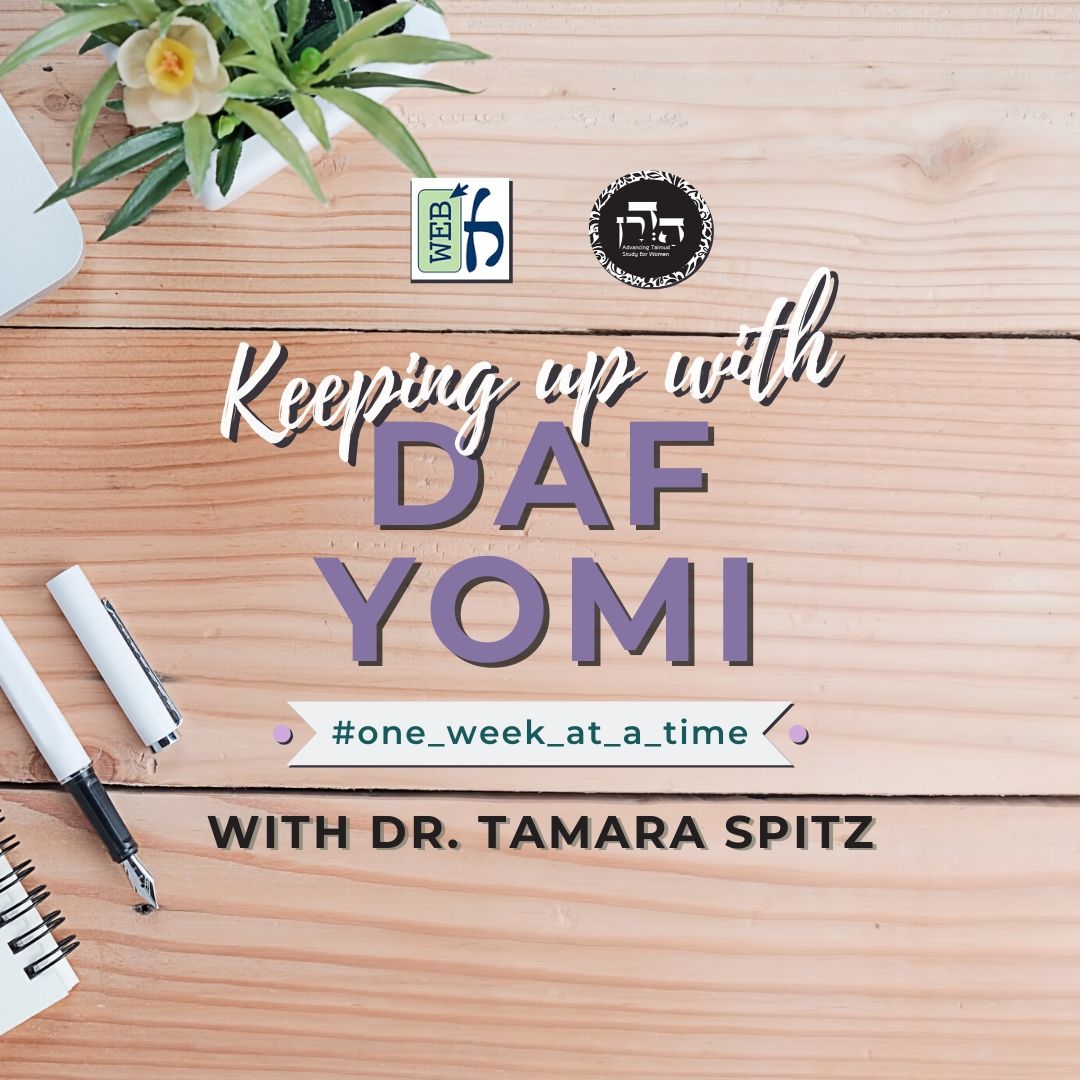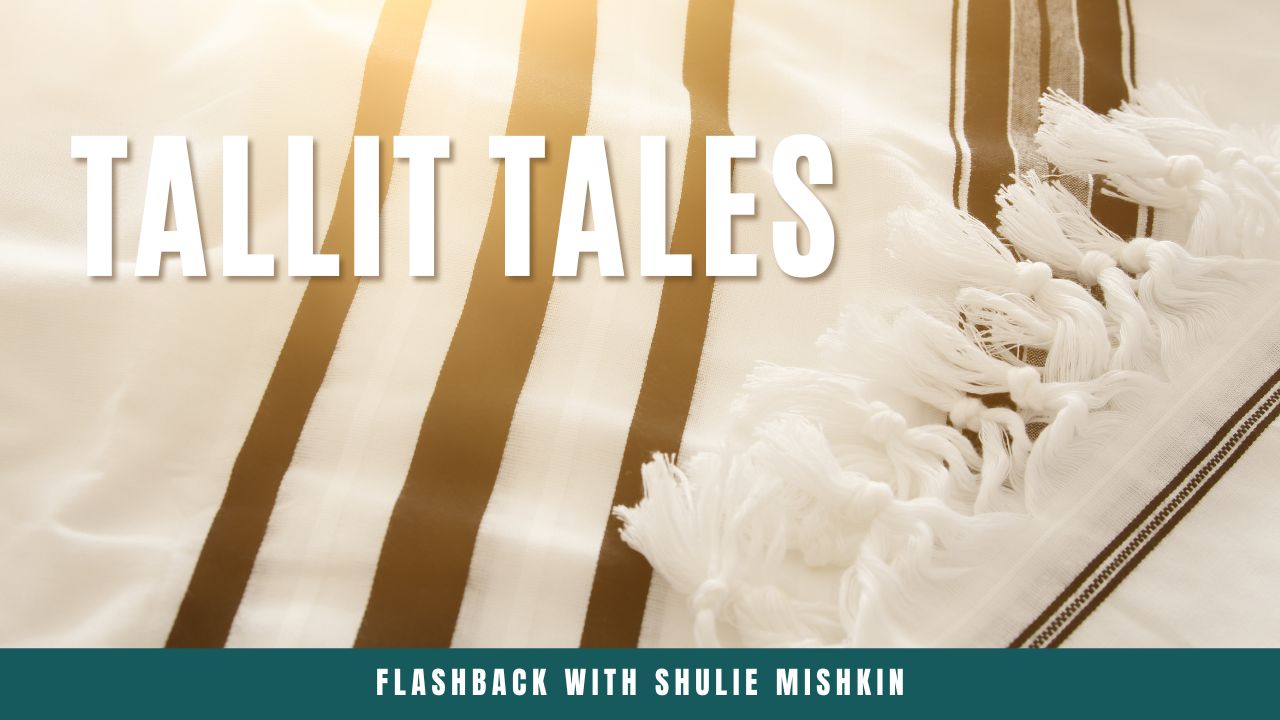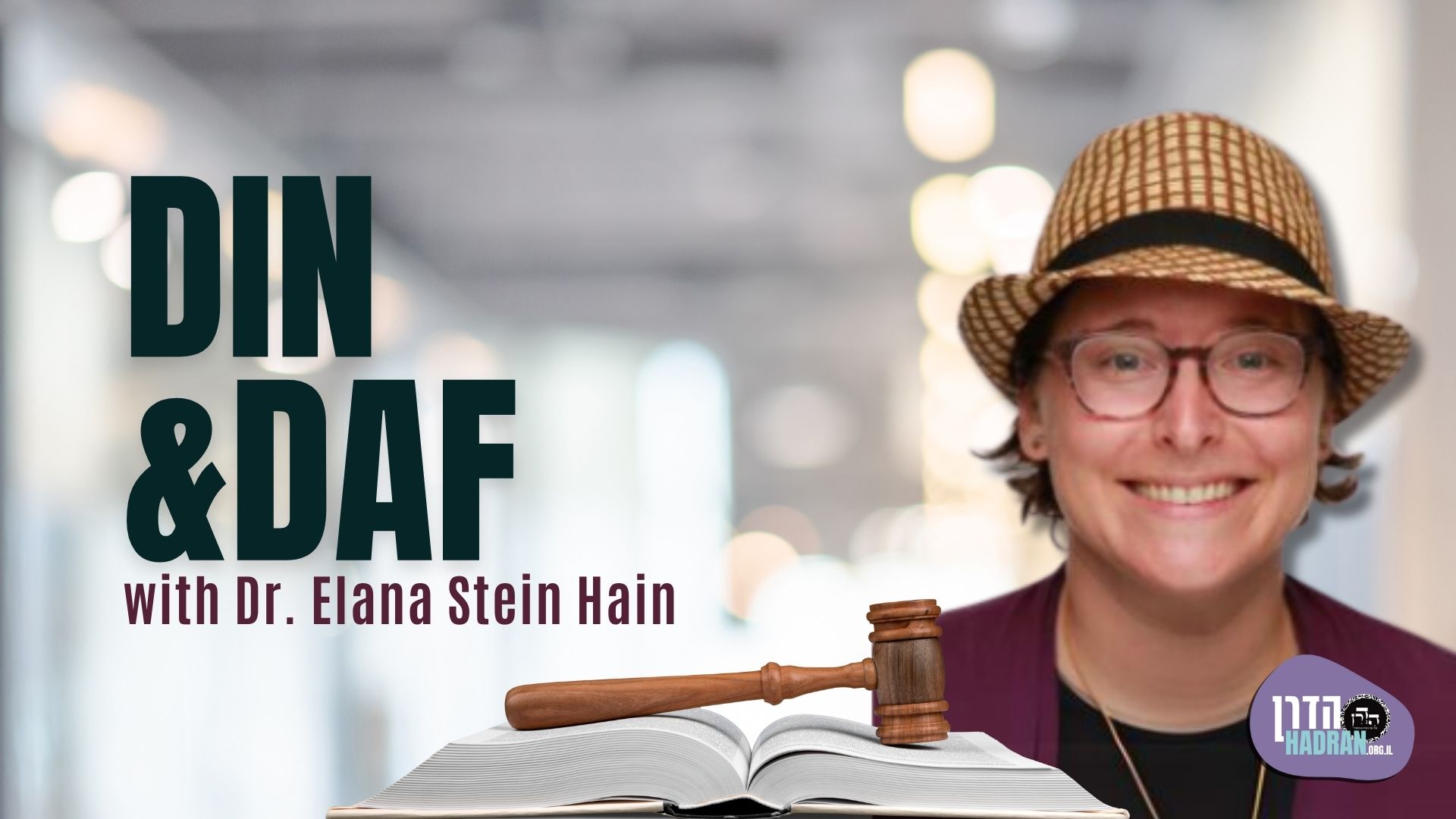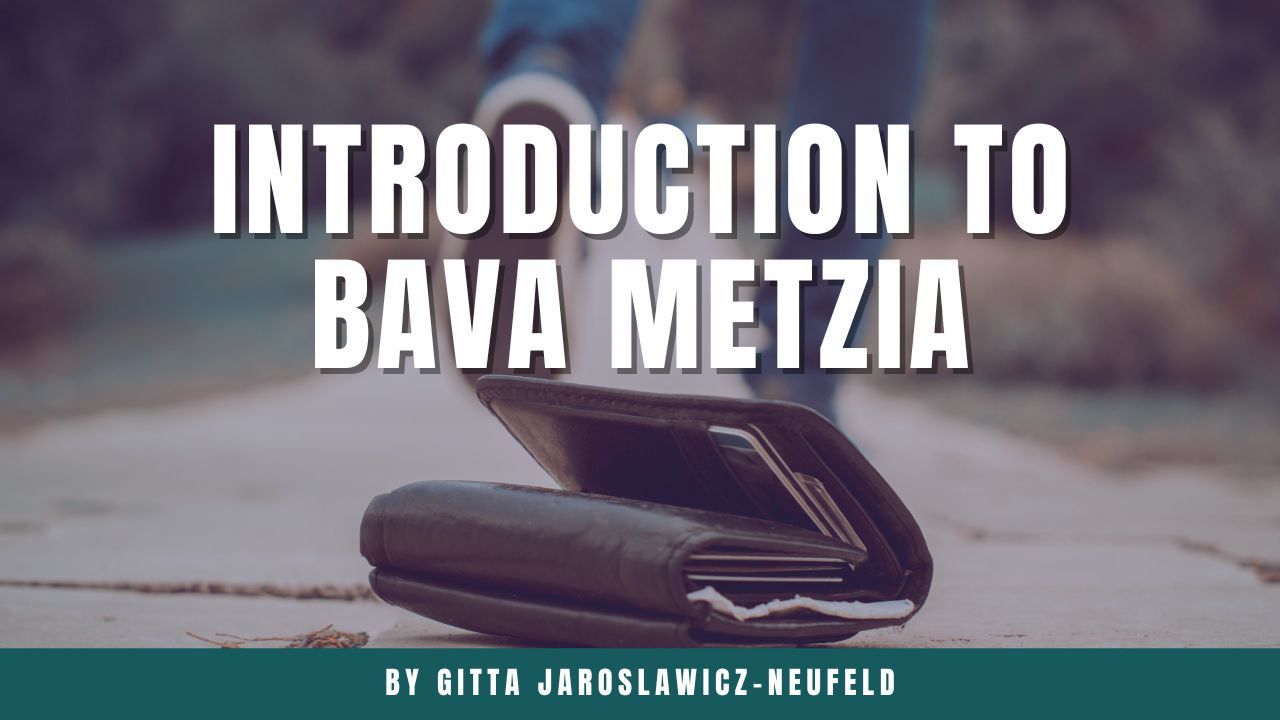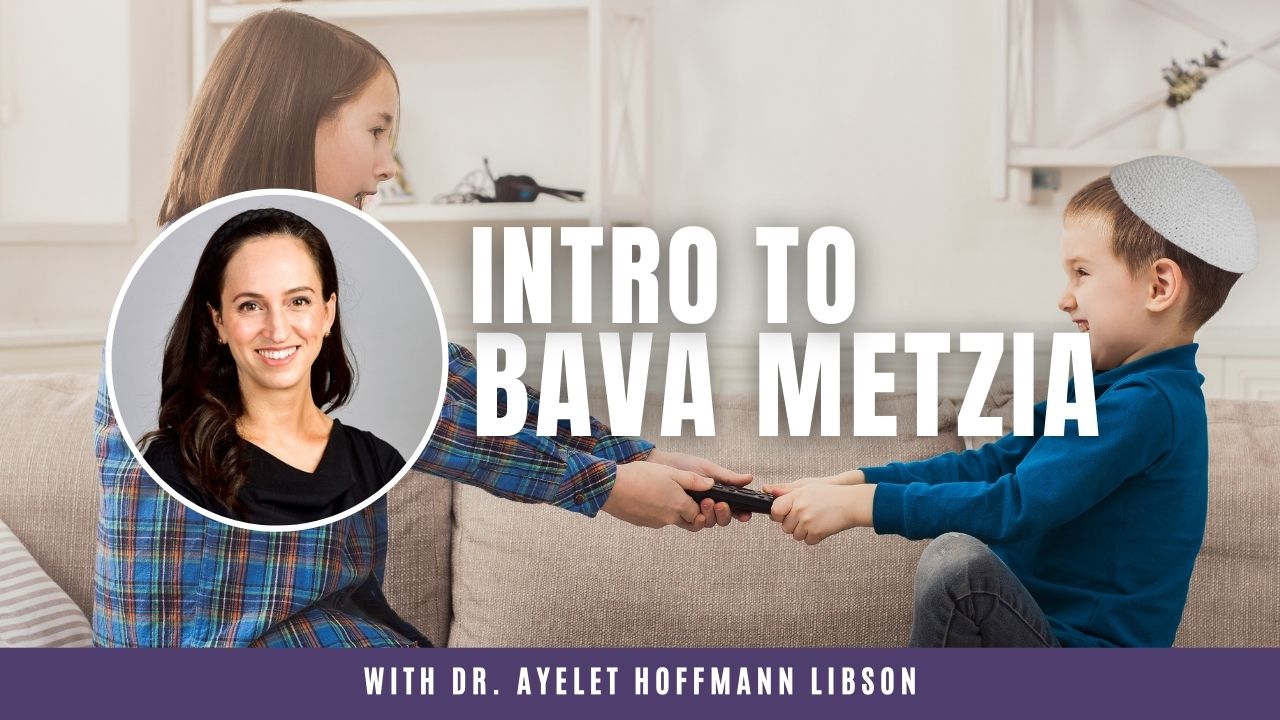Bava Metzia 2
שְׁנַיִם אוֹחֲזִין בְּטַלִּית, זֶה אוֹמֵר: ״אֲנִי מְצָאתִיהָ״, וְזֶה אוֹמֵר: ״אֲנִי מְצָאתִיהָ״. זֶה אוֹמֵר: ״כּוּלָּהּ שֶׁלִּי״, וְזֶה אוֹמֵר: ״כּוּלָּהּ שֶׁלִּי״. זֶה יִשָּׁבַע שֶׁאֵין לוֹ בָּהּ פָּחוֹת מֵחֶצְיָהּ, וְזֶה יִשָּׁבַע שֶׁאֵין לוֹ בָּהּ פָּחוֹת מֵחֶצְיָהּ – וְיַחְלוֹקוּ.
The early commentaries ask why this chapter, which discusses details of the halakhot of found items, precedes the second chapter, which discusses the fundamental halakhot of found items.
Tosafot explain that as tractate Bava Metzia follows tractate Bava Kamma, the halakhot of found items are elucidated in this chapter as a continuation of the topics discussed in the last chapter of Bava Kamma, which discussed the division of items between litigants by means of an oath, which is also the ruling in the mishna here (see Shita Mekubbetzet). The Rosh explains that because there is a suspicion of theft in this case, these matters are juxtaposed with the halakhot of theft, which are described at length in Bava Kamma.
MISHNA: If two people came to court holding a garment, and this one, the first litigant, says: I found it, and that one, the second litigant, says: I found it; this one says: All of it is mine, and that one says: All of it is mine; how does the court adjudicate this case? This one takes an oath that he does not have ownership of less than half of it, and that one takes an oath that he does not have ownership of less than half of it, and they divide it.
זֶה אוֹמֵר: ״כּוּלָּהּ שֶׁלִּי״, וְזֶה אוֹמֵר: ״חֶצְיָהּ שֶׁלִּי״, הָאוֹמֵר כּוּלָּהּ שֶׁלִּי – יִשָּׁבַע שֶׁאֵין לוֹ בָּהּ פָּחוֹת מִשְּׁלֹשָׁה חֲלָקִים, וְהָאוֹמֵר חֶצְיָהּ שֶׁלִּי – יִשָּׁבַע שֶׁאֵין לוֹ בָּהּ פָּחוֹת מֵרְבִיעַ. זֶה נוֹטֵל שְׁלֹשָׁה חֲלָקִים, וְזֶה נוֹטֵל רְבִיעַ.
If this one says: All of it is mine, and that one says: Half of it is mine, since they both agree that half of the cloak belongs to one of them, the conflict between them is only about the other half. Therefore, the one who says: All of it is mine, takes an oath that he does not have ownership of less than three parts, i.e., three-fourths, of it, and the one who says: Half of it is mine, takes an oath that he does not have ownership of less than one-quarter of it. This one takes three parts, and that one takes one-quarter.
הָיוּ שְׁנַיִם רוֹכְבִין עַל גַּבֵּי בְּהֵמָה, אוֹ שֶׁהָיָה אֶחָד רוֹכֵב וְאֶחָד מַנְהִיג, זֶה אוֹמֵר: כּוּלָּהּ שֶׁלִּי, וְזֶה אוֹמֵר: כּוּלָּהּ שֶׁלִּי – זֶה יִשָּׁבַע שֶׁאֵין לוֹ בָּהּ פָּחוֹת מֵחֶצְיָהּ, וְזֶה יִשָּׁבַע שֶׁאֵין לוֹ בָּהּ פָּחוֹת מֵחֶצְיָהּ, וְיַחְלוֹקוּ.
If two people were sitting in a riding position on the back of an animal, e.g., a donkey or camel, or one was sitting in a riding position on the animal and one was leading it by its halter, and this one says: All of it is mine, and that one says: All of it is mine, how does the court adjudicate this case? This one takes an oath that he does not have ownership of less than half of it, and that one takes an oath that he does not have ownership of less than half of it, and they divide it.
בִּזְמַן שֶׁהֵם מוֹדִים אוֹ שֶׁיֵּשׁ לָהֶן עֵדִים – חוֹלְקִין בְּלֹא שְׁבוּעָה.
When they admit to the validity of each other’s claims or when they each have witnesses attesting to their claims, they divide the disputed item without taking an oath, as an oath is administered only in a case where the parties have no other way to prove their claims.
גְּמָ׳ לְמָה לִי לְמִתְנָא זֶה אוֹמֵר אֲנִי מְצָאתִיהָ וְזֶה אוֹמֵר אֲנִי מְצָאתִיהָ, זֶה אוֹמֵר כּוּלָּהּ שֶׁלִּי וְזֶה אוֹמֵר כּוּלָּהּ שֶׁלִּי? לִיתְנֵי חֲדָא! חֲדָא קָתָנֵי: זֶה אוֹמֵר אֲנִי מְצָאתִיהָ וְכוּלָּהּ שֶׁלִּי, וְזֶה אוֹמֵר אֲנִי מְצָאתִיהָ וְכוּלָּהּ שֶׁלִּי.
GEMARA: The Gemara asks: Why do I need the tanna to teach two separate claims made by each party? Why does the tanna say both: This one says: I found it, and that one says: I found it; and in addition: This one says: All of it is mine, and that one says: All of it is mine? Let the tanna teach one case. The Gemara answers: The correct understanding of the mishna is that it teaches one claim of each party, as their claims were as follows: This one says: I found it and all of it is mine, and that one says: I found it and all of it is mine.
וְלִיתְנֵי ״אֲנִי מְצָאתִיהָ״, וַאֲנָא יָדַעְנָא דְּכוּלָּהּ שֶׁלִּי! אִי תְּנָא ״אֲנִי מְצָאתִיהָ״, הֲוָה אָמֵינָא: מַאי ״מְצָאתִיהָ״ – רְאִיתִיהָ. אַף עַל גַּב דְּלָא אֲתַאי לִידֵיהּ – בִּרְאִיָּה בְּעָלְמָא קָנֵי, תְּנָא: ״כּוּלָּהּ שֶׁלִּי״ – דְּבִרְאִיָּה לָא קָנֵי.
The Gemara asks: But let the tanna teach a case where each one merely claims: I found it, and I would know that the intention of each litigant is to claim: All of it is mine. The Gemara answers: If the tanna would teach only that each one claimed: I found it, I would say that what is the meaning of the claim: I found it? It means: I saw it. In other words, he is claiming that he saw the item first, and he believes that even though it did not reach his possession, he acquired it through mere sight. Since it would have been possible to think that this is an effective claim, the tanna teaches that the litigant states definitively: All of it is mine, to teach that one does not acquire a lost item through sight alone.
וּמִי מָצֵית אָמְרַתְּ מַאי ״מְצָאתִיהָ״ – רְאִיתִיהָ, וְהָא אָמַר רַבְנַאי ״וּמְצָאתָהּ״ – דַּאֲתַאי לִידֵיהּ מַשְׁמַע.
The Gemara challenges this explanation: But how can you say that what the term: I found it, means is actually: I saw it? But didn’t Rabbenai say in interpreting the verse: “And so shall you do with every lost item of your brother’s, which he has lost, and you have found it” (Deuteronomy 22:3), that “and you have found it” indicates that it came into his possession? The term find in the Torah refers exclusively to a situation where the item is in the possession of the finder.
אִין ״וּמְצָאתָהּ״ דִּקְרָא – דַּאֲתָא לִידֵיהּ מַשְׁמַע, וּמִיהוּ תַּנָּא לִישָּׁנָא דְעָלְמָא נָקֵט, וּמִדְּחָזֵי לֵיהּ אָמַר: אֲנָא אַשְׁכַּחִית, וְאַף עַל גַּב דְּלָא אֲתַאי לִידֵיהּ בִּרְאִיָּה בְּעָלְמָא קָנֵי, תָּנֵי: ״כּוּלָּהּ שֶׁלִּי״ – דְּבִרְאִיָּה בְּעָלְמָא לָא קָנֵי לַהּ.
The Gemara answers: Indeed, the phrase “and you have found it” in the verse certainly indicates that it came into his possession. But one might say that the tanna employed colloquial language in the mishna. And in colloquial language, once a person sees an item, he says: I found it, even if it did not yet come into his possession, because he believes that he acquired the item through mere sight. Since it would have been possible to understand the claim of: I found it, in this manner, the tanna teaches that the litigant states definitively: All of it is mine, to teach that one does not acquire a lost item through sight alone.
וְלִיתְנֵי ״כּוּלָּהּ שֶׁלִּי״ וְלָא בָּעֵי ״אֲנִי מְצָאתִיהָ״! אִי תָּנֵי ״כּוּלָּהּ שֶׁלִּי״ הֲוָה אָמֵינָא: בְּעָלְמָא דְּקָתָנֵי ״מְצָאתִיהָ״ בִּרְאִיָּה בְּעָלְמָא קָנֵי, תְּנָא ״אֲנִי מְצָאתִיהָ״ וַהֲדַר תְּנָא ״כּוּלָּהּ שֶׁלִּי״ דְּמִמִּשְׁנָה יַתִּירָה אַשְׁמְעִינַן דִּרְאִיָּה לָא קָנֵי.
The Gemara asks: But if that was the objective of the tanna, let him teach that each party need only state: All of it is mine, and the litigant would not need to say: I found it. The Gemara answers: If the tanna had taught that it is sufficient for each party to claim only: All of it is mine, I would say that in general, when the tanna teaches that one claims: I found it, he means that the finder acquires the item through mere sight. Therefore, he taught that the litigants claimed: I found it, and he then taught that the litigants claimed: All of it is mine, to teach that only when the litigants each make both of these claims does the court divide the item, as from the superfluous expression in the mishna he teaches us that one does not acquire the item through sight alone.
וּמִי מָצֵית אָמְרַתְּ חֲדָא קָתָנֵי? וְהָא ״זֶה״ וְ״זֶה״ קָתָנֵי: ״זֶה אוֹמֵר אֲנִי מְצָאתִיהָ וְזֶה אוֹמֵר אֲנִי מְצָאתִיהָ, זֶה אוֹמֵר כּוּלָּהּ שֶׁלִּי״ וְכוּ׳.
After explaining the viability of this interpretation, the Gemara asks: But how can you say that the mishna is teaching one claim of each party? But doesn’t the mishna teach: This one says, and again: This one says? In other words, the mishna writes: This one says: I found it, and that one says: I found it; and it states additionally: This one says: All of it is mine, and that one says: All of it is mine. From the fact that the tanna introduced each of the claims with the phrase: This one says, it is apparent that they are two separate claims, not one compound claim.
אָמַר רַב פָּפָּא, וְאִיתֵּימָא רַב שִׁימִי בַּר אָשֵׁי, וְאָמְרִי לַהּ כְּדִי: רֵישָׁא בִּמְצִיאָה, וְסֵיפָא בְּמִקָּח וּמִמְכָּר.
Rav Pappa said, and some say it was said by Rav Shimi bar Ashi, and some say it was an unattributed [kedi] statement: The first clause, where each party says: I found it, is referring to a case of a found item, where two people found one item. And the latter clause, where each party says: All of it is mine, is referring to a case of buying and selling, where each party claims that he is the one who bought the item from its seller.
וּצְרִיכָא:
And it is necessary for the mishna to teach its ruling both with regard to a found item and with regard to a purchase.
דְּאִי תְּנָא מְצִיאָה הֲוָה אָמֵינָא: מְצִיאָה הוּא דִּרְמוֹ רַבָּנַן שְׁבוּעָה עֲלֵיהּ מִשּׁוּם דְּמוֹרֵי וְאָמַר, חַבְרַאי לָאו מִידֵּי חָסַר בָּהּ, אֵיזִל אֶתְפִּיס וְאִתְפְּלֵיג בַּהֲדֵיהּ! אֲבָל מִקָּח וּמִמְכָּר, דְּלֵיכָּא לְמֵימַר הָכִי – אֵימָא לָא.
As had the tanna taught the case of a found item alone, I would say that it is only in the case of a found item that the Sages imposed an oath upon him, as in that case one can rationalize his actions and say: The other party, the one who in fact found the item, is not losing anything by not keeping all of it, as it was not his to begin with. I will go seize it from him and divide it with him. But in the case of buying and selling, where that cannot be said, say that the Sages did not impose an oath upon him.
וְאִי תְּנָא מִקָּח וּמִמְכָּר, הוּא דִּרְמוֹ רַבָּנַן שְׁבוּעָה עֲלֵיהּ מִשּׁוּם דְּמוֹרֵי וְאָמַר: חַבְרַאי דְּמֵי קָא יָהֵיב וַאֲנָא דְּמֵי קָא יָהֵיבְנָא, הַשְׁתָּא דִּצְרִיכָא לְדִידִי אֶשְׁקְלֵיהּ אֲנָא, וְחַבְרַאי לֵיזִיל לִטְרַח לִיזְבַּן, אֲבָל מְצִיאָה, דְּלֵיכָּא לְמֵימַר הָכִי – אֵימָא לָא. צְרִיכָא.
And had the tanna taught the case of buying and selling alone, one might say that it is specifically in this case that the Sages imposed an oath upon him, because he could rationalize his actions, saying to himself: The other party gave money to the seller and I gave money to the seller; now that I need it for myself, I will take it and let the other one go to the trouble to buy another item like the first item. But in the case of a found item, where that cannot be said, say that the Sages did not suspect that he seized an item that did not belong to him, and therefore there is no need to impose an oath upon him. Therefore, both cases are necessary.
מִקָּח וּמִמְכָּר, וְלִחְזֵי זוּזֵי מִמַּאן נָקֵט? לָא צְרִיכָא דְּנָקֵט מִתַּרְוַיְיהוּ, מֵחַד מִדַּעְתֵּיהּ וּמֵחַד בְּעַל כָּרְחֵיהּ, וְלָא יָדַעְנָא מִי הוּא מִדַּעְתֵּיהּ, וּמִי הוּא בְּעַל כָּרְחֵיהּ.
The Gemara asks: How can the mishna be referring to a case of buying and selling? But let us see from whom the seller took the money. Obviously, the one who gave him the money is the one who bought it. The Gemara answers: No, it is necessary in a case where he took money from both of them. He accepted the money willingly from the one to whom he wanted to sell the item, and he received the money against his will from the one to whom he did not want to sell the item, and I do not know who is the one from whom he took it willingly, and who is the one from whom he received it against his will. Consequently, the matter is clarified by means of an oath.
לֵימָא מַתְנִיתִין דְּלָא כְּבֶן נַנָּס, דְּאִי בֶּן נַנָּס, הָאָמַר:
§ The Gemara suggests: Let us say that the mishna is not in accordance with the opinion of ben Nannas, as, if it were in accordance with the opinion of ben Nannas, doesn’t he say that an oath is not administered to two parties in court when one of them is certainly lying?
כֵּיצַד אֵלּוּ וָאֵלּוּ בָּאִין לִידֵי שְׁבוּעַת שָׁוְא?
As it is stated in a mishna (Shevuot 45a): With regard to a case where a man said to his laborer: Go to the storekeeper and he will give you food in lieu of your salary, and sometime later the laborer claimed that the storekeeper did not give him anything while the storekeeper claimed that he did, the Rabbis say: The storekeeper and the laborer must each take an oath to support their claims, and the employer must pay them both. Ben Nannas says in response: How can you allow these people, i.e., the laborer, and those people, i.e., the storekeeper, to come to take an oath in vain? Since one of them is definitely lying, the Sages would not impose the taking of an oath that by definition must be false. Similarly, in the case of the mishna here, since the found item is divided between the parties in any case, according to the opinion of ben Nannas they should receive their portions without taking an oath.
אֲפִילּוּ תֵּימָא בֶּן נַנָּס, הָתָם וַדַּאי אִיכָּא שְׁבוּעַת שָׁוְא. הָכָא אִיכָּא לְמֵימַר דְּלֵיכָּא שְׁבוּעַת שָׁוְא, אֵימוֹר דְּתַרְוַיְיהוּ בַּהֲדֵי הֲדָדֵי אַגְבְּהוּהָ.
The Gemara rejects this suggestion: It is even possible for you to say that the mishna is in accordance with the opinion of ben Nannas. There, in the case of the laborer and the storekeeper, an oath is certainly taken in vain, as it is clear that one of them is lying. Here, there is room to say that there is no oath taken in vain. Say that they are both taking an oath truthfully, as they lifted the item together, and therefore each of them owns half of it. In this case, ben Nannas would agree that they both take an oath.
לֵימָא מַתְנִיתִין דְּלָא כְּסוֹמְכוֹס, דְּאִי כְּסוֹמְכוֹס, הָאָמַר: מָמוֹן הַמּוּטָּל בְּסָפֵק – חוֹלְקִין בְּלֹא שְׁבוּעָה.
The Gemara suggests further: Let us say that the mishna is not in accordance with the opinion of Sumakhos, as, if it were in accordance with the opinion of Sumakhos, doesn’t he say the following principle: In a case of property of uncertain ownership, the parties divide it without taking an oath.
וְאֶלָּא מַאי, רַבָּנַן? הָא אָמְרִי הַמּוֹצִיא מֵחֲבֵרוֹ עָלָיו הָרְאָיָה!
The Gemara rejects this suggestion: Rather, what opinion does the mishna follow? Does the mishna follow the opinion of the Rabbis, who disagree with Sumakhos? Don’t they say that in a case of property of uncertain ownership the burden of proof rests upon the claimant? In the case of the mishna neither side offers proof.
הַאי מַאי, אִי אָמְרַתְּ בִּשְׁלָמָא רַבָּנַן: הָתָם דְּלָא תָּפְסִי תַּרְוַיְיהוּ אֲמַרוּ רַבָּנַן הַמּוֹצִיא מֵחֲבֵירוֹ עָלָיו הָרְאָיָה, הָכָא דְּתַרְוַיְיהוּ תָּפְסִי [פָּלְגִי] לַהּ בִּשְׁבוּעָה.
The Gemara answers: What is this comparison? Granted, if you say that the mishna is in accordance with the opinion of the Rabbis, there is room to distinguish between two cases: There, in the case of property of uncertain ownership, where both parties are not grasping the property, the Rabbis say that the burden of proof rests upon the claimant since the one with possession of the property ostensibly has the right to that property. Here, in the case of the mishna, where both are grasping the property and neither has exclusive possession of the item, they divide it with the proviso that they take an oath.
אֶלָּא אִי אָמְרַתְּ סוֹמְכוֹס, הַשְׁתָּא וּמָה הָתָם דְּלָא תָּפְסִי תַּרְוַיְיהוּ – חוֹלְקִין בְּלֹא שְׁבוּעָה, הָכָא דְּתַרְוַיְיהוּ תָּפְסִי לַהּ – לֹא כׇּל שֶׁכֵּן!
The Gemara continues to state its proof that the mishna is not in accordance with the opinion of Sumakhos: But if you say that the mishna is in accordance with the opinion of Sumakhos, how do you resolve the following contradiction: Now, if there, in a case where they are not both grasping the property, they nevertheless divide it without taking an oath, here, where they are both grasping the property, is it not all the more so that they should divide it without taking an oath?
אֲפִילּוּ תֵּימָא סוֹמְכוֹס: כִּי אָמַר סוֹמְכוֹס שֶׁמָּא וְשֶׁמָּא, אֲבָל בָּרִי וּבָרִי – לָא אָמַר.
The Gemara rejects this suggestion: You may even say that the mishna is in accordance with the opinion of Sumakhos. When Sumakhos states that in a case of property of uncertain ownership, the parties divide it without taking an oath, that is in the case of an uncertain claim and an uncertain claim, i.e., when the circumstances are such that neither party can state definitively that he is entitled to the property. But in a case of a certain claim and a certain claim, where each party states definitively that he is entitled to the property, Sumakhos does not say that they divide the property without taking an oath.
וּלְרַבָּה בַּר רַב הוּנָא, דְּאָמַר: אָמַר סוֹמְכוֹס אֲפִילּוּ בָּרִי וּבָרִי, מַאי אִיכָּא לְמֵימַר?
The Gemara asks: And according to the opinion of Rabba bar Rav Huna, who said that Sumakhos says that even in a case of a certain claim and a certain claim the parties divide the property without an oath, what is there to say to establish the mishna in accordance with the opinion of Sumakhos?
אֲפִילּוּ תֵּימָא סוֹמְכוֹס, כִּי אָמַר סוֹמְכוֹס – הֵיכָא דְּאִיכָּא דְּרָרָא דְמָמוֹנָא, אֲבָל הֵיכָא דְּלֵיכָּא דְּרָרָא דְמָמוֹנָא – לָא.
The Gemara answers: You may even say that the mishna is in accordance with the opinion of Sumakhos. When Sumakhos says that property of uncertain ownership is divided, he is referring to a case where the litigants have a financial association with the item independent of their claims to it. But where the litigants do not have a financial association with the item beyond their claims, they do not divide it without taking an oath.
וְלָאו קַל וָחוֹמֶר הוּא? וּמָה הָתָם דְּאִיכָּא דְּרָרָא דְמָמוֹנָא לְמָר, וְאִיכָּא דְּרָרָא דְמָמוֹנָא לְמָר,
The Gemara asks: But is it not an a fortiori inference? If there, in a case where this Master has a financial association with the item, and that Master has a financial association with the item,



